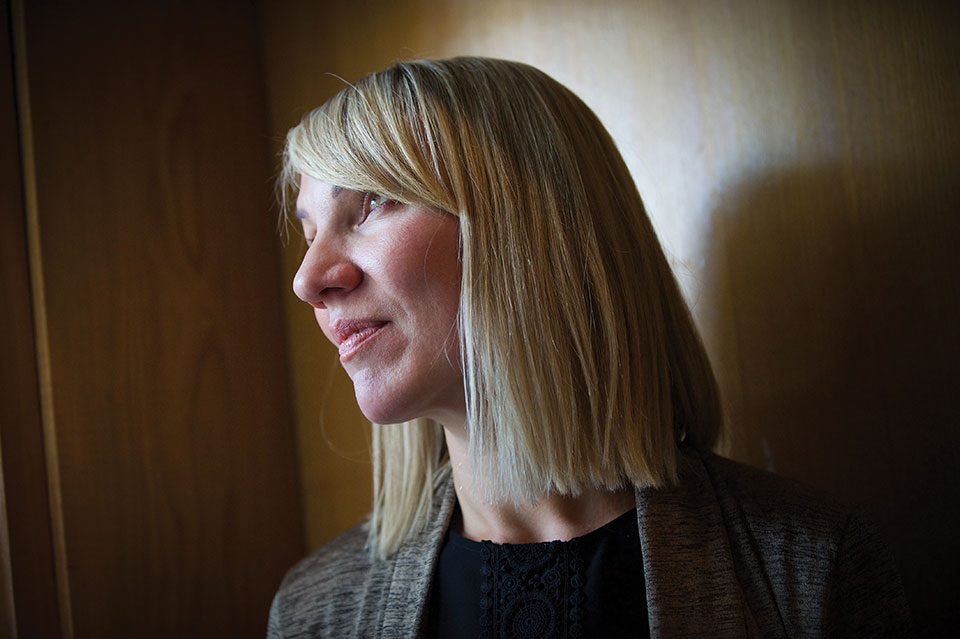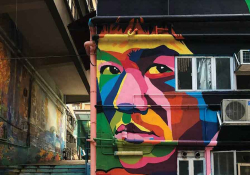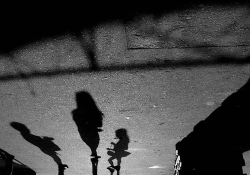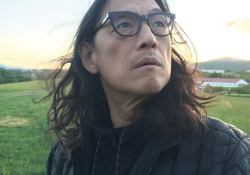On Home, Belongingness, and Multicultural Britain: A Conversation with Hannah Lowe

Born to an English mother and a Jamaican-Chinese father, Hannah Lowe is the author of Chick (2013), which celebrates the multicultural life of London and its environs in the 1980s and ’90s. It won the Michael Murphy Memorial Award for Best First Collection and was shortlisted for the Forward, Aldeburgh, and Seamus Heaney Best First Collection Prizes. She was named by Poetry Book Society as one of Twenty Next Generation Poets in 2014. Her second collection, Chan (2016), is based on her research in migration and mixed-race studies, drawing on the life of Joe Harriott, the Jamaican alto saxophonist who made his name in 1950s London, and Jamaican migrants who traveled from Kingston to Liverpool in 1947 on the SS Ormonde. She has also published a family memoir, Long Time, No See (2015), a more direct treatment of her father’s experiences, bringing a neglected chapter of multicultural London to life. She lectures in creative writing at Brunel University and is the current Poet in Residence at Keats House.
Jennifer Wong: Your home culture is a mix of different places. How do you see the meaning of home and of being away?
Hannah Lowe: I didn’t grow up in a different place and then migrate to England. I still live very near the place where I was born and have always seen England as my home. Beyond that, I see London, where I live, almost as a separate state from the rest of England or the UK, although I don’t meant that in a separatist way, more a sense of feeling very strongly rooted to the city, to its multicultural makeup, and to a kind of urban living. But in a mixed-race household, with parents of different cultures, there’s always an awareness of what exists beyond the local. Even when I was a child—though I didn’t know where Jamaica or China were, or why my dad had come to Britain from Jamaica, or why his father had come to Jamaica from China—they were always anchors in my understanding of myself.
Wong: How does the notion of place change your writing?
Lowe: In writing Chick, my first collection, I wasn’t consciously trying to make an announcement of my mixed-race identity (it’s probably important here to understand that I don’t look obviously mixed-race). I wanted to write about my father and his life and his unorthodox occupation as a gambler in London’s East End. But inevitably, the writing explored living in a multicultural household and my father’s migration, my black and Chinese grandparents, and my own sense of identity. It was a wonderful surprise that people responded so well to the book, and that acceptance also felt like a permission. Before then, I worried that people might see me as an imposter, because I look white and particularly because I haven’t been a victim of direct racism, if that is considered to be a collective and determining factor of being black or mixed. I still have these anxieties, but I also can’t turn away from the material I find compelling and important. Chan, the collection that followed Chick, is much more focused on mixed-race themes and addresses racism, migration, and settlement more directly.
Wong: You talked about homeland, that it is an anchor of some sort even if it is not comfortable territory.
Lowe: One of the reasons it might not be comfortable concerns appearances, and the associated experiences, as I’ve already mentioned. I don’t feel I can go to Jamaica and announce myself as Jamaican, partly because I look more like the colonizer than the colonized! Nor do I feel it would be easy to go to China and announce I am Chinese. I wouldn’t expect to be accepted on those terms, and moreover, I’ve been born and raised in Britain. I’m British. And yet I do feel deeply rooted to those places, because of my lineage, and I want to write about them.
Wong: Do you think there is an ideal or utopian place where you belong?
Lowe: No, although it’s an interesting question. I feel like, as far as possible, this is where I belong, right here, in north London, England, but I expect there are people who feel much more English than I do. I have an ambivalence about Englishness and no nationalistic feeling whatsoever. England is home because of its familiarity. I love the cultural life here, but I feel alienated from the dominant political modes of the UK at the moment, and from the class system, which is so deeply entrenched here, and certainly from the legacies of the British Empire.
In the light of Brexit, I feel quite pessimistic about how Britain may reconfigure this identity, and representations of immigrant identities (in poetry, fiction, film, and so on) will be a part of this dialogue.
Wong: In your view, how has Brexit changed the people’s sympathies or attitudes toward the representation of multiculturalism and immigrant identities?
Lowe: I think Brexit is a very complicated political event, but I read it as mostly a contest centered on class—the working classes hugely disenfranchised by austerity versus the middle and upper classes, and this mapped out over regions, so the traditional white working-class terrains of the Northeast, for example, pushing against the increasing wealth and cosmopolitanism of the Southeast. I don’t think many people actually understood what the European Union does, but the idea of leaving Europe gained enormous momentum last year, with immigration being positioned by Brexiteers as a major reason. I heard an insidious, nostalgic nationalism being articulated in places—the idea that Britain could be restored to the former glory of the empire. I don’t think we, as a nation, have ever been shamed about the empire in the way that, say, Germany has been about the Nazi years, and I think this lack of redress and reconciliation is a problem. I was horrified to hear the empire being regaled during the Brexit campaigns.
Multiculturalism was championed by the New Labour government at the end of the 1990s, in direct contradiction of Thatcher’s concept of Britain as a monocultural nation. It’s never been without its problems, but the sentiment of celebrating Britain’s plurality was a good one. In the light of Brexit, I feel quite pessimistic about how Britain may reconfigure this identity, and representations of migrant identities (in poetry, fiction, film, and so on) will be a part of this dialogue. I hope these will challenge any notion of monoculturalism or the propagation of a Britain hermetically sealed off from other nations.
Wong: The “Borderliner” sequence of poems in Chan articulates the impossibility of decoding cultural hybridity entirely. It is as if one’s identity is always evolving based on acquisition of new knowledges. Can you shed light on your use and experiment with the poetic voices in the sequence (e.g., “Genealogy” and “Milk River / Yellow River”)? Are they meant to continue each other and remap a larger consciousness?
Lowe: Those particular poems reflect a tension between collective and individual consciousness, something I try to capture by juxtaposing two narratives, using bold/nonbold typography, the meaning of which varies across the poems but is sometimes intended to signal the tension between narratives that are well known, seemingly objective and/or “historical,” written in bold text, and those that are subjective, personal, unknown, silenced, or suppressed.
How do you “return” to a place that you never in fact left, and whose codes and culture you do not have immediate access to? What kinds of belonging can be enacted in these contexts, if there is any belonging at all?
So in “Milk River / Yellow River,” I retell the public history of the Hakka Chinese, who have migrated far and wide from China, including to Jamaica. In Jamaica, the Hakka people are very proud of their ancestry, and the community is tight-knit, prosperous, Christian, quite morally upright. But my own grandfather, who was Hakka, was by all accounts none of these things! He lived a rather nomadic and financially reckless life, fathered many children by different black women, neglected those women and children. He beat my father so badly that my father once held a gun to his head while he slept, but he was too frightened of him to kill him. So the poems contrast these two narratives, the public-historical and the personal-historical, and invite the reader to see the tension there.
The poems are continuations of each other. The same ideas are at work in “Genealogy,” which retells the story of being taken by members of the Chinese Benevolent Association to the Chinese temple in Kingston and Chinese cemetery, where members helped me find my grandfather’s grave. This was such a surprise to me, as I hadn’t even known there was a cemetery, let alone that he was buried there. But there was a mild expectation that I had come to pay “filial duty” to my grandfather, which the poem attempts to complicate by articulating my personal knowledge of him as a man who beat his children and perhaps wasn’t worthy of my respect. The tension in the poem is supposed to emerge through speaking this secret knowledge—the fact I can say it in the poem but certainly not at the graveside.
Wong: How do you perceive or understand your Chinese roots?
Lowe: My relationship to China has always been filtered through my father, who saw himself as a Jamaican, but I’m not sure whether that was at the exclusion of his Chinese identity or an absorption of it. What I would say was that he had a very troubled relationship with his Chinese father, who was both his caregiver and his abuser. His father ran a Chinese grocery store in Jamaica, like many other Chinese-Jamaicans, but he was also a prolific gambler who lost his business several times, and so my father’s childhood was an unstable and nomadic existence, moving from one Chinese grocery to another. His father beat him brutally, the scars of which were still visible on my dad’s body as an old man. So my dad rarely spoke about my grandfather, and for good reason.
I am sure my dad could speak the Hakka dialect that his father would have spoken, but he never did. He rarely mentioned his father but transmitted “China” through his cooking, which he was very proud of, and which was a big part of our family life. When I remember my childhood home, I recall there was a certain Chinese aesthetic there, in the artwork, the porcelain, the fabrics—almost as though Chinese was never spoken but inscribed. But China, for me, always comes filtered through Jamaica—I am more familiar with the Chinese Jamaican community, having traveled there and spent time with them, than I am with China, which I have yet to visit.
Wong: In articulating place, do you ever find it hard when you fuse symbols and myths from another place?
Lowe: What interests me about being “diasporic,” as someone of the second generation, is not so much the knowledge you have of that place, because how can you know a place you haven’t seen or lived in? I’m much more interested in how as a child and adult I have imagined those places, and those imaginings may have had little rooting to reality. As a writer, there’s a great energy in that idea.
Wong: In your poems you unravel the magic and dreams rooted in the past: going back to the past to shed light on the present. As compared with your first collection, Chan reveals a more collective, historical past where individuals emerge. How do you see the relevance of history in the negotiation of a diasporic identity?
Lowe: Until recently, the “old country” has always been my focus. I’ve been fixated on what my father’s life must have been in rural Jamaica of the 1930s or what the China that my grandfather left at the beginning of last century was like—so in that sense “history” is crucial to the negotiation of diasporic identity, and I think plenty of people have written about the “imaginary homeland” in different manifestations. In writing Chan, I read historical texts, such as histories of Jamaican decolonization, and of Jamaican culture and music—books like Ian Thomson’s The Dead Yard, which gives quite a bleak view of Jamaica, I think, but what comes through in this book are the stories of individuals, and I suppose that’s always for me where history lifts off the page, when I encounter the individual narratives and struggles of people against their circumstances—and this is what I try to re-create in Chan, through various storytelling poems and monologues.
But the present-day Jamaica is also a focus in Chan. I try to capture some of the anxieties I felt in traveling back to a place I had a tenuous claim to, and in going there to ask questions that might not have been particularly welcome. Both my father’s remaining sister and brother are presented as ambivalent to my questions about my grandfather, since there was no love lost between them and their father. Similarly, I wanted to know about the secretive gambling dens that had once existed in Chinatown in Kingston, where he had played mahjong, but my feeling was that this wasn’t a side of the Chinese presence that anyone wanted to show me. I think this is also part of the negotiation of diasporic identity—how do you “return” to a place that you never in fact left, and whose codes and culture you do not have immediate access to? What kinds of belonging can be enacted in these contexts, if there is any belonging at all?
Wong: In poems like “In” or “Distressed British Seamen,” your poetic representation of England is blended with fiction and reality, hope and disillusionment. How do you see the relationship between nation/state and one’s identity? Do you feel there is a necessary attachment and tension of allegiances?
Lowe: The names of the distressed British seamen in Chan are borrowed from real people, listed on the Ormonde passenger list, and the term “Distressed British Seaman” refers to any seamen who find themselves without a ship in a foreign port. In wartime, this might be because a ship has been bombed, but a source I found indicated that in peacetime the reasons might be less heroic—“womanizing,” brawling, drinking, imprisonment, and so on. I became quite fascinated with these possibilities but also with seafarers themselves, who in some ways lived quite cosmopolitan lives, traveling between continents, working with foreign seamen, and often living in very mixed communities in port towns. One of the DBS is in fact called Saeed, an Arabic name. When the first DBS announces, “I knew black men at Tiger Bay – sea dog / from Cape Verde, Somali skippers. Now this lot / quiz me: England this or England that?” he is saying the Ormonde passengers are not the first black people he’s seen, because Britain is already a hybrid nation, and many of the sea-faring communities have a decades-long presence. So in other words, I intended for the fictional seamen of Chan to have an ambivalent relationship to the nation constructed on white monocultural terms.
Wong: What writers do you like?
Lowe: That’s a big question! My first love was for black women writers such as Toni Morrison and Alice Walker. Their novels are the ones I fell for as an undergraduate and still go back to. In terms of poetry, the first poet to really speak to me was Philip Levine, the American poet who writes about the working-class and immigrant communities of Detroit. And since then, there are many poets I have discovered and loved: Derek Walcott, Jack Gilbert, Marie Howe, Sharon Olds . . . oh, the list is endless, but you might notice I have a big thing for the Americans.
September 2017
For more, read “The Aunt” by Hannah Lowe.














